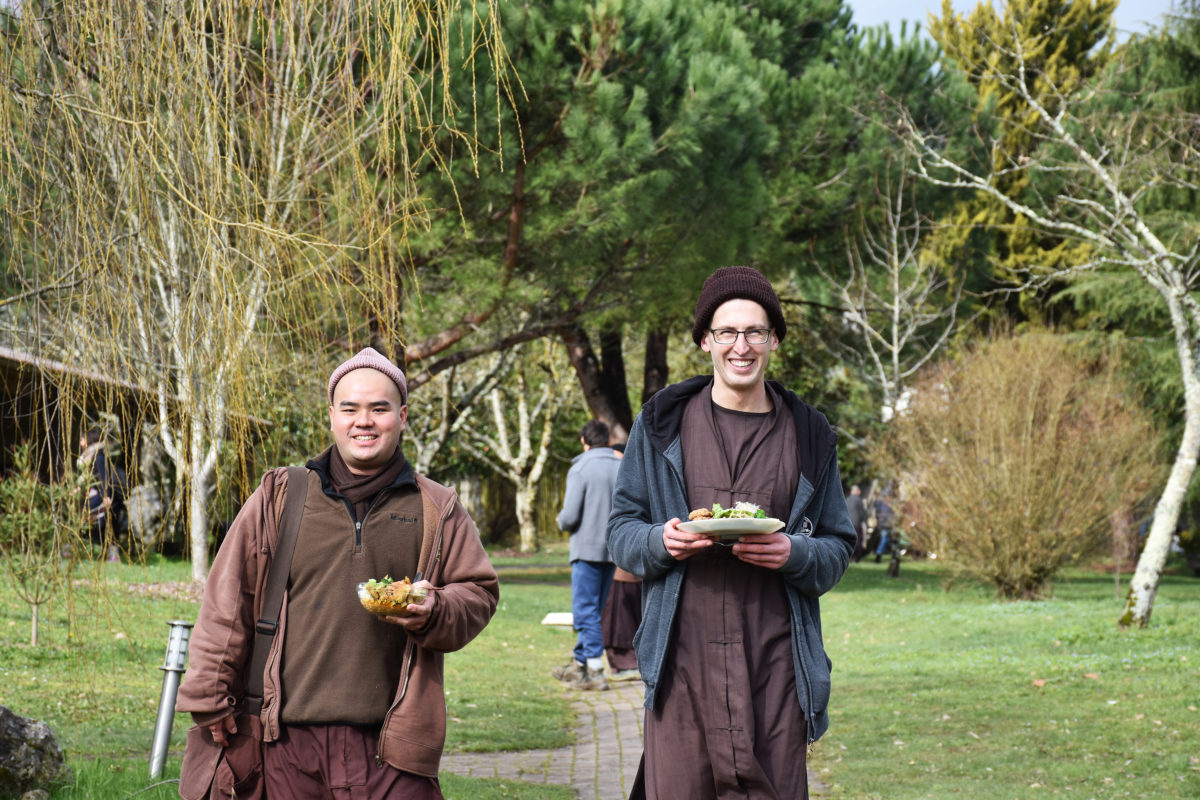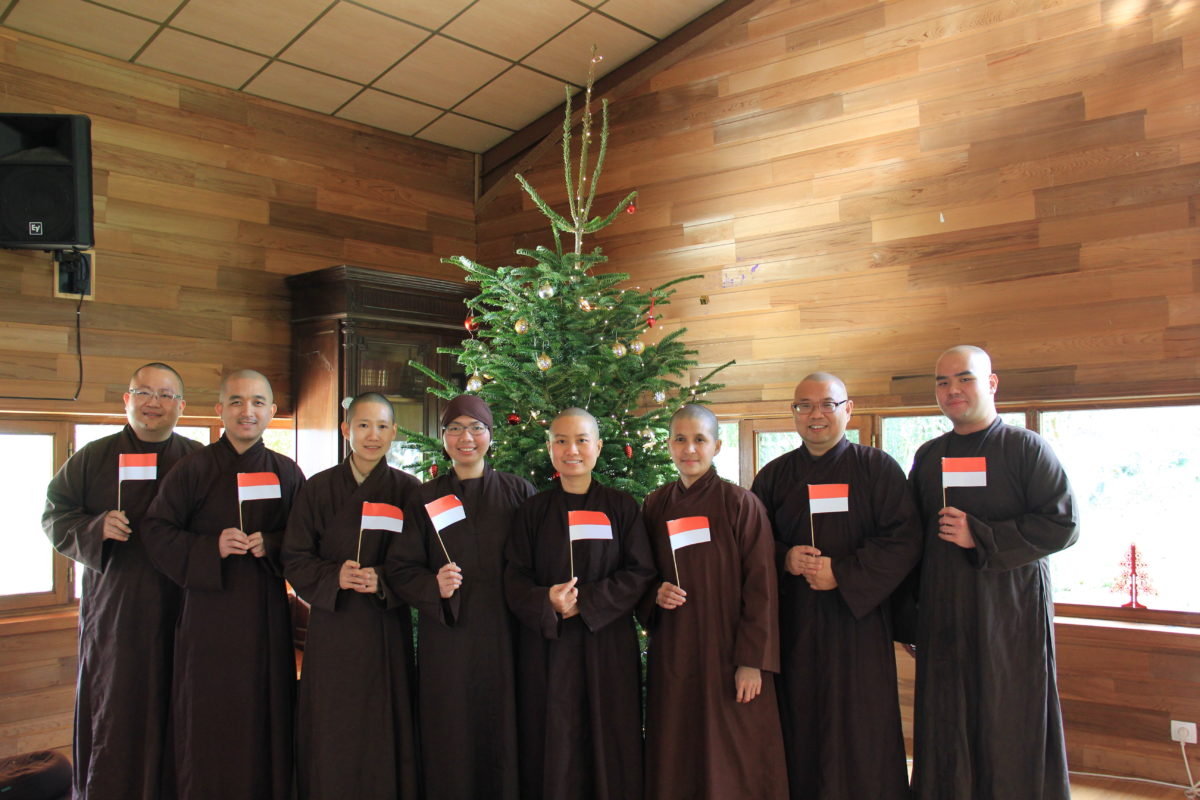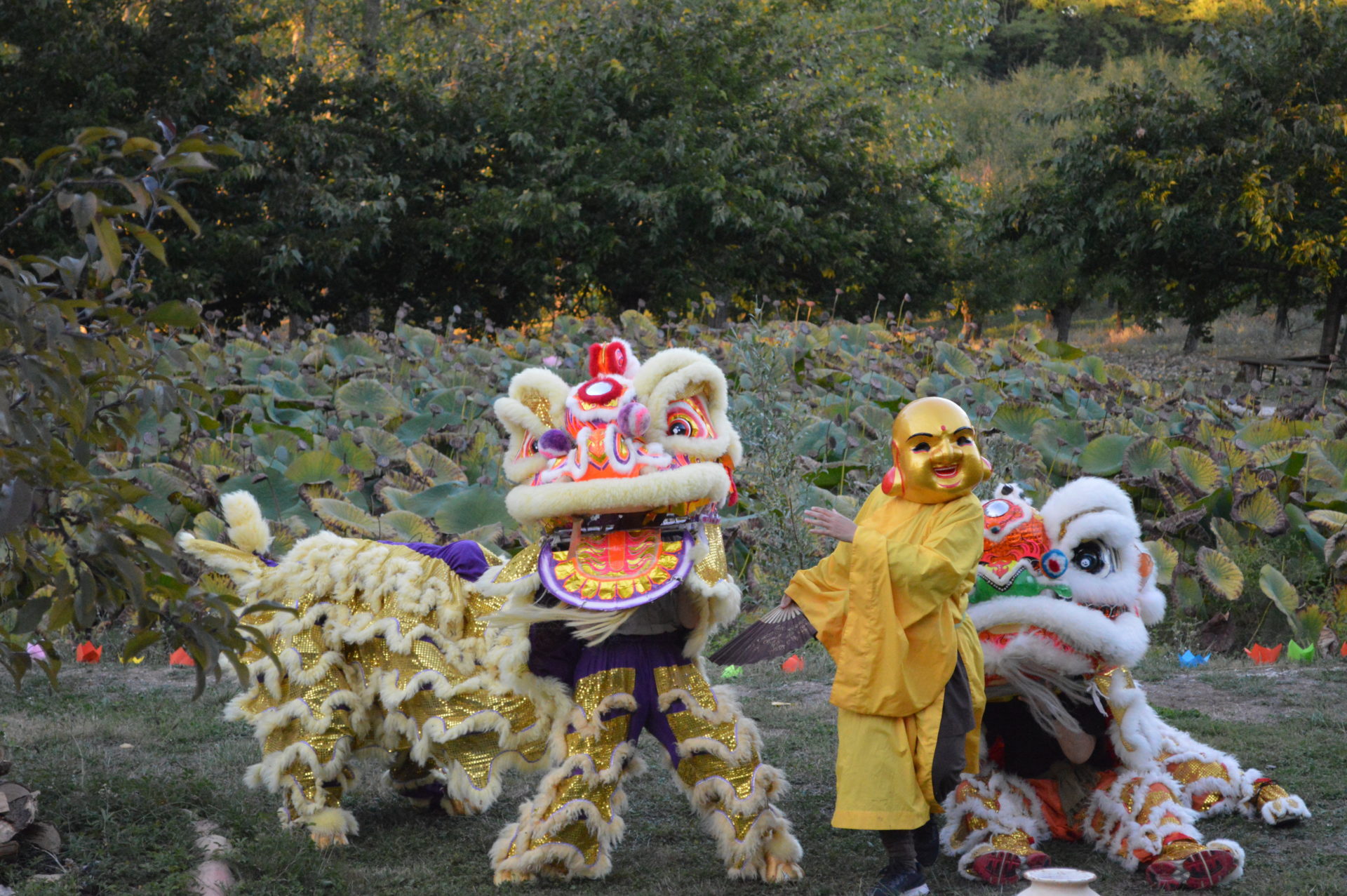Go with Enjoyment!
By Brother Bhadravarman (Brother Warman)

As a young person, I liked to play, but eventually I lost my playfulness. The suffering I encountered robbed me of my playfulness. My father passed away several months before I ordained as a monk. Additionally, the difficulties I encountered as a social worker took away my joy and happiness.
Go with Enjoyment!
By Brother Bhadravarman (Brother Warman)

As a young person, I liked to play, but eventually I lost my playfulness. The suffering I encountered robbed me of my playfulness. My father passed away several months before I ordained as a monk. Additionally, the difficulties I encountered as a social worker took away my joy and happiness.
I quit play in the beginning of my path as a monk. When I arrived at Plum Village, I thought that play applied only to young monks and nuns. I didn’t talk or play much. I just focused on my practice of healing the wounds inside myself. I was serious and determined to heal my wounds with practice and study. I read Thay’s books and listened to his Dharma talks. I also read many Mahayana sutras and Thay’s commentaries about them.
As I read the sutras, I faced a situation in which I felt like I was flying up in the sky; I forgot how to stay grounded on the Earth. For example, I shared things in Dharma sharing that I now see as abstract because I didn’t share from my personal experience. I learned in Plum Village that we’re encouraged to share more from our personal experience rather than teachings or abstract ideas. Thay has said that if we don’t have a solid ground in the basic practice, we’ll experience this condition of flying in the sky when we study the Mahayana sutras. I feel lucky that Thay gave us this warning.
My mentor, Brother Phap Luu (Brother Stream), and friends on the path helped me to be more grounded. They encouraged me to share more in Dharma discussions. My mentor told me that if I could transform my wounds, I could share my living insights with others.
During the monastic retreat in Plum Village in the spring of 2017, I had a chance to watch dance performances by many of my brothers and sisters, including Sister Chan Duc (Sister Annabel) and Sister Dieu Nghiem (Sister Jina). I even saw Brother Phap Ung dancing during his Dharma talk. I deeply admired their practice, and suddenly I was able to admire their playfulness, too. It changed my perception; I could see that play is actually for everyone. My mentor invited me to dance ballet for the Lunar New Year’s Eve performance. I danced with him and some of the brothers from Son Ha, a monastic brothers’ residence in Upper Hamlet.
As I observed Thay at Plum Village, I could see that Thay also liked to play. I had made the assumption that, as a Zen master, Thay would be serious and stern. But Thay often smiled and made jokes during the Dharma talks, and everyone laughed. Sometimes when Thay did walking meditation with the Sangha, Thay would pick up a leaf, smile, and then make a bit of a playful gesture—and again, everyone laughed.

Thay’s reflection on the practice gave insights about play. Three questions helped me learn more about play.
The first question: When does play nourish my practice?
Play can be a component of practice, and practice can be a component of play. They are interconnected. When we play soccer or ping-pong, hike, or go to a beach or to the mountains, we’re practicing as well. Participating in sports or exercise helps me to release tension in my body, and it nourishes the monastics and lay friends’ togetherness, brotherhood, and sisterhood.
Before I ordained, I tried to escape my suffering by watching lots of movies and listening to many songs. But they didn’t help me to transform unwholesome seeds; in fact, they just made the seeds bigger. Slowly I saw that not many movies and songs are wholesome. Many of them water seeds of anger, hatred, and loneliness.
Now I’m more selective in watching movies. I just watch movies people recommend to me. Many cartoon movies are very wholesome and have good moral lessons. I watched many movies with my Wake Up Sangha in Bogor, Indonesia. I remember that when we watched Frozen, it didn’t just talk about romantic love between a prince and princess as in a fairy tale; love between sisters was also part of the message. This is the kind of love available in the monastery: our brotherhood and sisterhood.
The second question: Play and brotherhood/sisterhood—how do they complement each other?
I see play as a tool to connect with others. Many people ask the Indonesian brothers and sisters in Plum Village how we can be so happy. The answer is: because we know how to play. Every time we gather, we share a lot of funny stories and laugh. Sometimes the other brothers and sisters join us, and we’re always open to welcoming them. Sometimes we translate our jokes into English, hoping they’ll understand, even though it doesn’t always work!
I’ve learned that the togetherness we have as brothers and sisters is important in my spiritual life. When we have formal or informal sharings, I can see that we have an aspiration to deepen our practice and not just to lose ourselves in play. To me, play is a foundation for building brotherhood and sisterhood. When our brotherhood and sisterhood bond is strong, we play together and nourish each other’s practice. In this way, play and practice complement each other.
The third question: How can we practice not to lose ourselves in amusements?
This question helps me take care not to play too much. It’s good if I know how to play; the next step is to learn how to play in moderation. I know if I talk and make too many jokes, I can easily disregard the effects on others. I used to do this, knowing that sometimes my words hurt others.
In the beginning of my monastic life, I decided not to engage in idle talk, as recommended in Thay’s book Stepping into Freedom. In the beginning it was extremely tough. But the practice of joking more mindfully helped me to not hurt others. Slowly, I learned to talk and make jokes in this new way. I felt like a baby just born into a spiritual life. It took me some years to learn how to talk and play again, but with more awareness and joy.
I began to understand what Thay often said: loneliness is the sickness of our time. Slowly, I recognized that idle talk isn’t as bad as I’d thought. Informal or casual talk can help me find more commonalities with other people. I used to suffer sometimes because of what I thought others might think of me. If I didn’t talk much, people might think I’m a serious person, and they wouldn’t approach me. But as I talked with other people, they discovered I’m not too serious and can make jokes too. Then I grew happier as I found out that they didn’t think of me in that way. Idle talk may sometimes be necessary, if done carefully. I just need to remember not to get carried away with conversations that water unwholesome seeds.
In retreats with young people, we play lots of games. It helps us get to know each other in a fun way and also nourishes our joy and contentment. Recently, I played hide-and-seek with some brothers in Son Ha. I fell in a puddle and got my clothes muddy, but I still enjoyed the game. It nourished my inner child.
The novices’ seventh precept on not being caught in worldly amusements says:
Aware that many songs, films, books, amusements, and games can damage body and mind and waste precious time that could be used for study and practice, I am determined not to be drowned in these distractions. I am determined not to read novels, look at worldly films or books, or seek distraction by singing or listening to love songs or other kinds of music that cause negative emotions to arise. I will not waste time playing electronic games or gambling.
Selective watering for me means to choose songs, films, and activities that can’t damage my body and mind. I listen to Plum Village songs, other Buddhist songs, and some “worldly” songs, but only if I know the lyrics are wholesome. In Plum Village, we’re careful about choosing wholesome songs; sometimes we change the lyrics so they’re more wholesome. Finally, sometimes I have to say no when the brothers ask me to play, if I’ve already played enough.
I enjoy reading, writing, drinking tea, sitting, and walking when I have free time. I know that when I enjoy each moment, I have actually played. When I walk and enjoy every step I make, it’s a kind of play. I play with my inner child by embracing him with my steps and breathing. I remember Sister Chan Duc sharing that before giving a Dharma talk, Thay used to say, “Di choi” in Vietnamese, which means, “Let’s play.” But she shared that a better English translation would be, “Come and enjoy a walk with Thay.” This phrase helps me see that to play means to bask in what’s going on. If I study, practice, and work with enjoyment, I’m actually playing at the same time.
One time, Thay watched the monks and nuns playing soccer on a beach. Thay said, “[Playing soccer is] joyful, but you won’t change the suffering. The suffering is still there.” When I heard this story, I began to understand the meaning of play in light of Thay’s teachings. Play becomes a tool to generate feelings of joy and happiness. But it doesn’t help us to transform suffering. It’s the insight generated by the practice of mindfulness and concentration that transforms suffering at the root. Thay reminds us that we need to find joy and happiness before starting to embrace our suffering.
I see play as one of the Dharma doors Thay has proposed as part of renewing Buddhism. One question of the “Reflection on the Practice” is, “Which of Thay’s Dharma doors are most effective for you?” My answer is play! If I didn’t see the joy and playfulness of the Plum Village monastics, I wouldn’t be here. Play helps me to enter the door of the monastic life, reinforcing the awareness that our practice can be fun and doesn’t have to be heavy all the time.
One time Thay was asked, “How can Western sisters and brothers become closer to each other like the Vietnamese sisters and brothers?” Thay answered, “It’s not about Western sisters and brothers. But also I think that people can become closer to each other if they play together. So I suggest that Western brothers and sisters need to play a bit more, and be more relaxed. Because you think playing like that is not a practice physically.”
One of my Indonesian brothers used to say, “Don’t be naughty,” before he’d leave Plum Village for a retreat or home visit. It’s a message that parents, older brothers, and older sisters usually say before they leave home. But a while back, he changed it. Now he says to me, “Please be naughty!” I see this message as encouragement for me to be more playful and joyful. I told him that I’m doing well and I’m becoming more naughty. As a novice, I now like to play, and on occasion I say to my brothers, “Let’s di choi!”
Brother Bhadravarman (Brother Warman) was ordained as a novice monk at Wihara Ekayana Arama, Jakarta, Indonesia. He has lived in Upper Hamlet since 2015 and is in training to receive the full ordination as a bhikshu in Plum Village.

